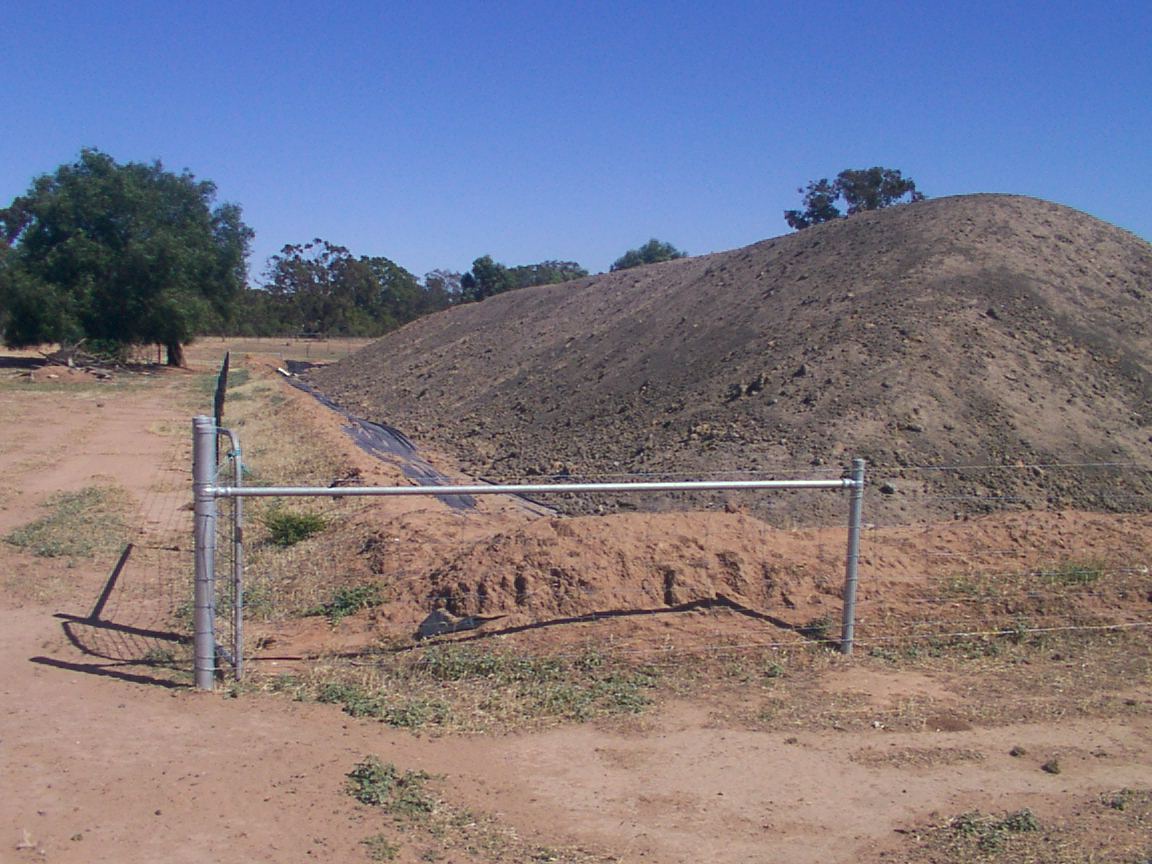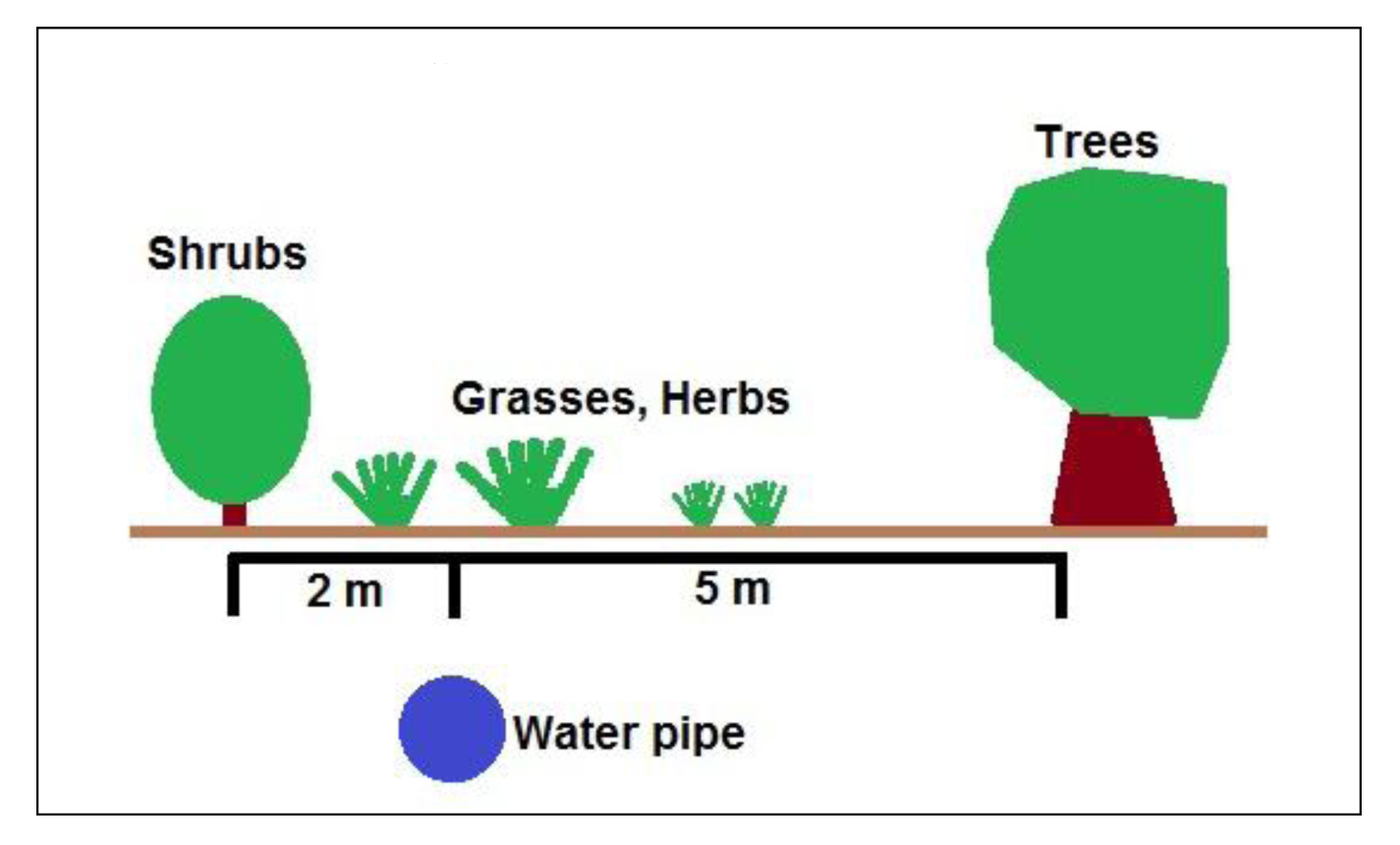Biosolids are a product of treated sludge from a wastewater treatment plant and can be used as a soil conditioner or fertiliser for agricultural and horticultural use.
Our biosolids are available to GWMWater customers to 'take and use' for free.
What to do
If you're interested in 'taking and using' our biosolids, get in touch with us.
Current Stockpiles
We stockpile biosolids for at least three years to meet Environmental Protection Agency (EPA) safety standards.
Stockpiles are currently available at the following locations:
Town |
Stockpiled since |
| Horsham | 2009 |
| Sea Lake | 2009 |
| Kaniva | 2013 |
| Stawell | 2013 |

A biosolids stockpile
Further information...
Published by: Environmental Protection Authority (EPA) Victoria Date: April 2004
Australian and New Zealand Biosolids Partnership (ANZBP) (external website) The ANZBP website provides information about biosolids including, how they are produced, what is in them, how they can be used, their benefits and the potential risks of using them. |
At GWMWater, we're committed to managing our natural resources responsibly and delivering services in ways that minimise the impact on the environment.
To support our commitment, we've developed an AS ISO 14001:2004 accredited Environmental Management System (EMS), which we apply to all aspects of our work.
Our EMS contains policies and guidelines for...
Waste managementWe're committed to reducing the waste we generate and send to landfill. Our waste management is guided by the principles set out in the Environment Protection Authority’s Waste Management Hierarchy to avoid and reduce, reuse, recycle and then dispose of the remainder in a responsible way.
Fire protectionOur Fire Protection Plan is based on hazard identification and hazard reduction.
Indigenous engagementWe recognise the spiritual relationship between Indigenous peoples and the land and water and are committed to protecting Indigenous cultural heritage.
Weeds and pest managementWe understand the damage that weeds and pests can have on the environment and have developed policies to manage weed and pest issues responsibly. |
Using the EMS, we identify risks and rank them according to their impact on the environment. From here, we set targets, undertake monitoring, raise awareness and provide training for our staff and contractors. We also use our EMS to control incidents and our overall impact on the environment.
For more information about our EMS, contact us to speak to our Environmental Officer.
If you're planning to plant trees or shrubs, it's important to avoid planting them too close to a rural pipeline in case we need to do work on a pipe.
To find out where our pipelines are located, use our interactive map of GWMWater assets or get in touch with us.
Tips for planting near a pipeline
To help us to access and maintain the water network:
- Large trees should be planted at least 5 metres from a pipeline.
- Shrubs should be planted at least 2 metres from a pipeline.
- Grasses, legumes and herbs can be planted directly on the pipeline with the understanding that they may need to be removed if work is required on a pipe.

For more information about planting trees or shrubs near a rural pipeline, please call us on 1300 659 961 during business hours.
Further information...
Designing your on-farm piped system If you're planning to install your on-farm piped system, we have tools and advice available to help you come up with the best design for your property.
A wildlife pond is an inground water source designed to provide habitat for wildlife. A 17 kL water rebate is available to rural landholders who construct and register their wildlife pond.
|
If you're planning to install your on-farm piped system, we have tools and advice available to help you come up with the best design for your property.
A good design will aim to:
- increase farm productivity by selecting the best location for tanks and troughs
- save pumping by using land elevation and the pressure provided by your pipeline connection to reticulate water around your property
- reduce the cost to install tanks, troughs and pipe on your property
Your design must also provide a peak 72 hour on-farm backup storage to satisfy the service standards in our ![]() Rural Customer Charter.
Rural Customer Charter.
Tools and advice
On-Farm Water Reticulation Guide
We've published a comprehensive On-Farm Water Reticulation Guide to help you design and install your on-farm system. The guide provides practical and technical advice covering all aspects of a piped on-farm system. Download a copy or contact us to get your free printed copy of the guide.
![]() On-Farm Water Reticulation Guide (4.9MB, 104 pages)
On-Farm Water Reticulation Guide (4.9MB, 104 pages)
Interactive map of GWMWater assets
Use our Interactive map of GWMWater assets to access land elevation information for your property to help design your system to reduce on-farm pumping.
Further information...
Monitoring your rural pipeline supply Simple tips to help you recognise costly leaks or other water-wasting situations as soon as possible.
A wildlife pond is an inground water source designed to provide habitat for wildlife. A 17 kL water rebate is available to rural landholders who construct and register their wildlife pond.
Planting trees near a rural pipeline If you're planning to plant trees or shrubs, it's important to avoid planting them too close to a pipeline in case we need to do work on a pipe. |
GWMWater customers supplied from rural pipeline systems have fully tradable water allowances, which are registered at an individual customer level with the Victorian Water Register.
Customers have the option to trade either part or all of these water allowances on a temporary or permanent basis. This means that customers have greater flexibility and freedom in managing their water resources. Customers can:
- amalgamate water allowances
- subdivide water allowances
- permanently trade water allowances
- temporarily trade water allowances.
The information below outlines some of the most important rules and conditions concerning the trade and purchase of water allowances. You'll find more detailed information on the application forms, or if you'd rather have a discussion, feel free to give us a call.
Water can be traded between your properties, between friends, family or other pipeline customers, or through Water Partners. Water availability and prices can be found on the website.
Amalgamating a water allowance
Amalgamation of water allowances is the combining of two or more existing water allowances into a single entity.
- The allowances need to be held in common ownership or be associated to a single farming enterprise.
- The appropriate documents and proof are required if allowances aren't in common ownership (e.g. a partnership agreement or lease document).
- The amalgamated allowance can only be attached to one supply system.
- Approval is dependent on the capability of the pipeline system as determined by GWMWater's hydraulic model.
Download an ![]() Application to Amalgamate a Water Allowance
Application to Amalgamate a Water Allowance
Subdividing a water allowance
The subdivision of a water allowance splits a single water allowance into two or more water allowances.
- Water allowances can be made up of more than one land parcel.
- Water allowances must be connected to land with existing meters, or to lands that have lodged an application to connect with the rural supply system.
- The owner of the water allowance decides how the water will be subdivided and reallocated.
- Land parcels with only standard meters require a water allowance of at least 100 kL.
- The primary allowance of 730 kL will remain with the primary (house) meter.
- Sharing meters between land parcels isn't allowed.
Download an ![]() Application to Subdivide a Water Allowance
Application to Subdivide a Water Allowance
Permanent and temporary trade of a water allowance
A permanent water trade transfers ownership of a water allowance on a permanent basis. A temporary water trade transfers ownership of a water allowance on a temporary basis for the remainder of that particular financial year.
- The minimum volume of water allowance able to be traded is 100 kL.
- The primary allowance of 730 kL isn't permitted to be traded and is vested with GWMWater.
- Water allowances can't be traded between the Grampians and Murray delivery systems.
- Approval is dependent on the capability of the pipeline system as determined by GWMWater's hydraulic model
- A minimum standard allowance of 100 kL is required to be connected to the pipeline system. If you want to trade all of your standard allowance, you need to disconnect from the system at your own expense.
- The water rates associated with the seller’s water allowance must be paid before a trade being approved.
Download an ![]() Application for Permanent Trade of Water Allowance
Application for Permanent Trade of Water Allowance
Download an ![]() Application for Temporary Trade of Water Allowance
Application for Temporary Trade of Water Allowance
| Pipeline water allowance trading is covered by Section 124 of the Water Act 1989 and supplied in accordance with the conditions contained in GWMWater’s |
Page 11 of 18

